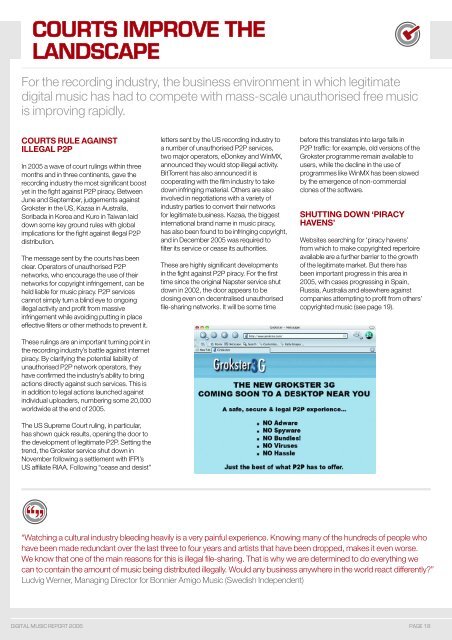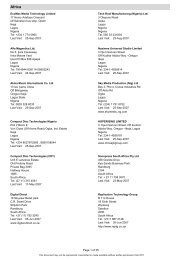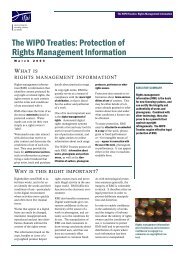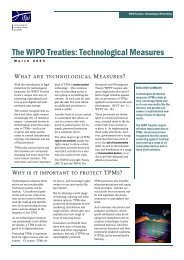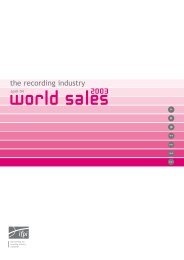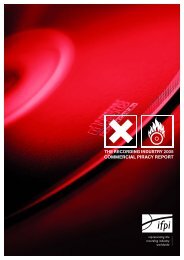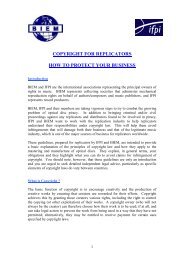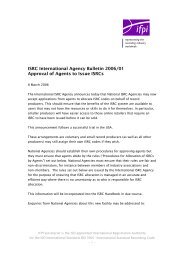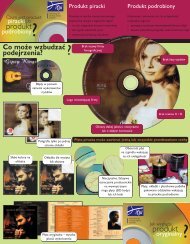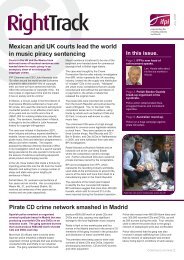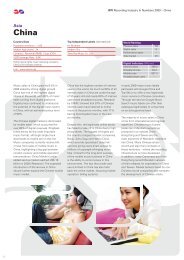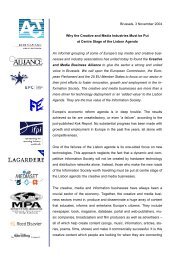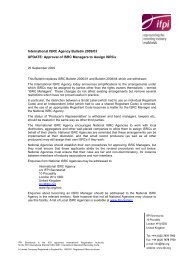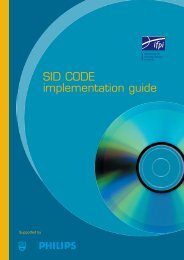2006 - IFPI
2006 - IFPI
2006 - IFPI
You also want an ePaper? Increase the reach of your titles
YUMPU automatically turns print PDFs into web optimized ePapers that Google loves.
COURTS IMPROVE THE<br />
LANDSCAPE<br />
For the recording industry, the business environment in which legitimate<br />
digital music has had to compete with mass-scale unauthorised free music<br />
is improving rapidly.<br />
COURTS RULE AGAINST<br />
ILLEGAL P2P<br />
In 2005 a wave of court rulings within three<br />
months and in three continents, gave the<br />
recording industry the most significant boost<br />
yet in the fight against P2P piracy. Between<br />
June and September, judgements against<br />
Grokster in the US, Kazaa in Australia,<br />
Soribada in Korea and Kuro in Taiwan laid<br />
down some key ground rules with global<br />
implications for the fight against illegal P2P<br />
distribution.<br />
The message sent by the courts has been<br />
clear. Operators of unauthorised P2P<br />
networks, who encourage the use of their<br />
networks for copyright infringement, can be<br />
held liable for music piracy. P2P services<br />
cannot simply turn a blind eye to ongoing<br />
illegal activity and profit from massive<br />
infringement while avoiding putting in place<br />
effective filters or other methods to prevent it.<br />
These rulings are an important turning point in<br />
the recording industry’s battle against internet<br />
piracy. By clarifying the potential liability of<br />
unauthorised P2P network operators, they<br />
have confirmed the industry’s ability to bring<br />
actions directly against such services. This is<br />
in addition to legal actions launched against<br />
individual uploaders, numbering some 20,000<br />
worldwide at the end of 2005.<br />
The US Supreme Court ruling, in particular,<br />
has shown quick results, opening the door to<br />
the development of legitimate P2P. Setting the<br />
trend, the Grokster service shut down in<br />
November following a settlement with <strong>IFPI</strong>’s<br />
US affiliate RIAA. Following “cease and desist”<br />
letters sent by the US recording industry to<br />
a number of unauthorised P2P services,<br />
two major operators, eDonkey and WinMX,<br />
announced they would stop illegal activity.<br />
BitTorrent has also announced it is<br />
cooperating with the film industry to take<br />
down infringing material. Others are also<br />
involved in negotiations with a variety of<br />
industry parties to convert their networks<br />
for legitimate business. Kazaa, the biggest<br />
international brand name in music piracy,<br />
has also been found to be infringing copyright,<br />
and in December 2005 was required to<br />
filter its service or cease its authorities.<br />
These are highly significant developments<br />
in the fight against P2P piracy. For the first<br />
time since the original Napster service shut<br />
down in 2002, the door appears to be<br />
closing even on decentralised unauthorised<br />
file-sharing networks. It will be some time<br />
before this translates into large falls in<br />
P2P traffic: for example, old versions of the<br />
Grokster programme remain available to<br />
users, while the decline in the use of<br />
programmes like WinMX has been slowed<br />
by the emergence of non-commercial<br />
clones of the software.<br />
SHUTTING DOWN ‘PIRACY<br />
HAVENS’<br />
Websites searching for ‘piracy havens’<br />
from which to make copyrighted repertoire<br />
available are a further barrier to the growth<br />
of the legitimate market. But there has<br />
been important progress in this area in<br />
2005, with cases progressing in Spain,<br />
Russia, Australia and elsewhere against<br />
companies attempting to profit from others’<br />
copyrighted music (see page 19).<br />
“Watching a cultural industry bleeding heavily is a very painful experience. Knowing many of the hundreds of people who<br />
have been made redundant over the last three to four years and artists that have been dropped, makes it even worse.<br />
We know that one of the main reasons for this is illegal file-sharing. That is why we are determined to do everything we<br />
can to contain the amount of music being distributed illegally. Would any business anywhere in the world react differently?”<br />
Ludvig Werner, Managing Director for Bonnier Amigo Music (Swedish Independent)<br />
DIGITAL MUSIC REPORT <strong>2006</strong> PAGE 18


